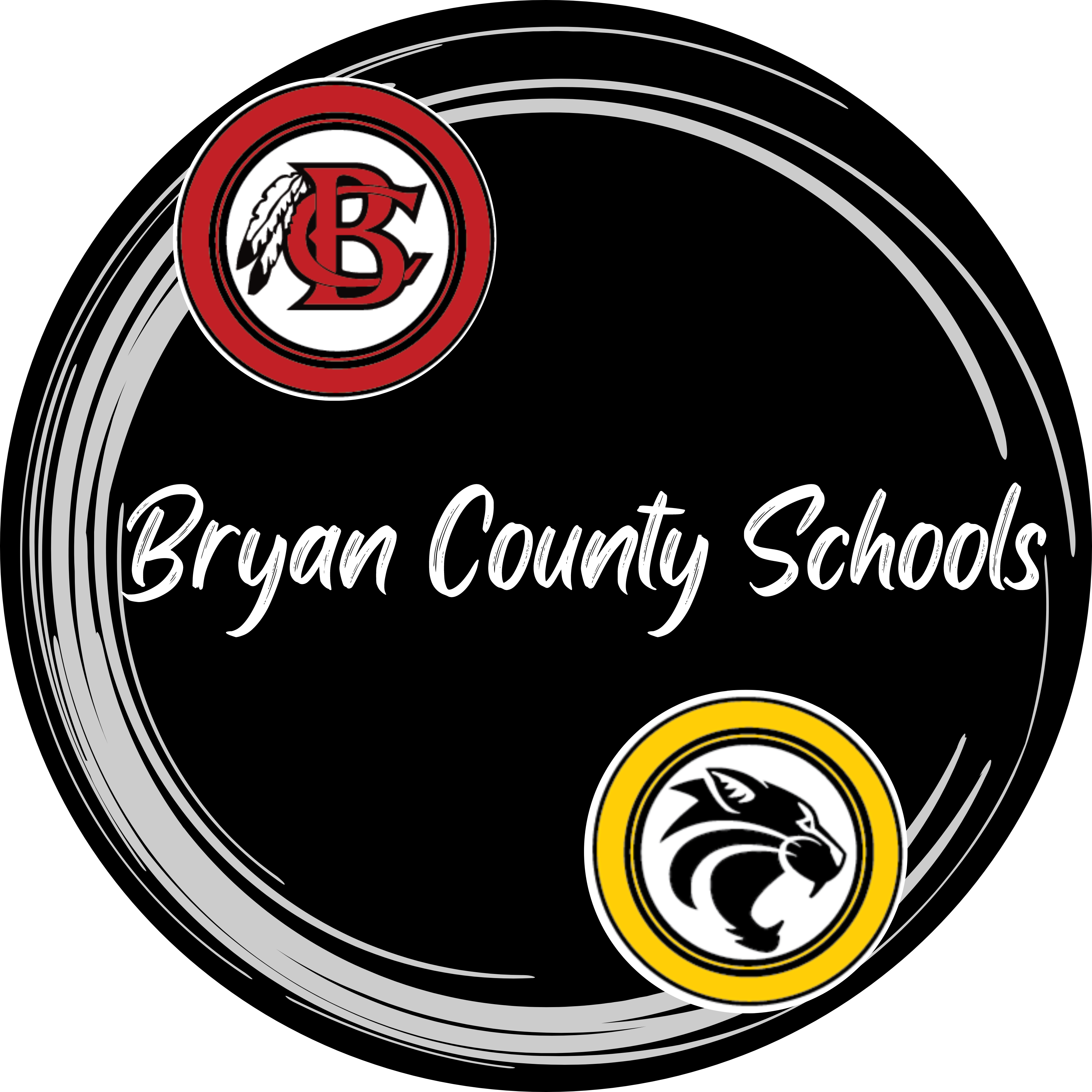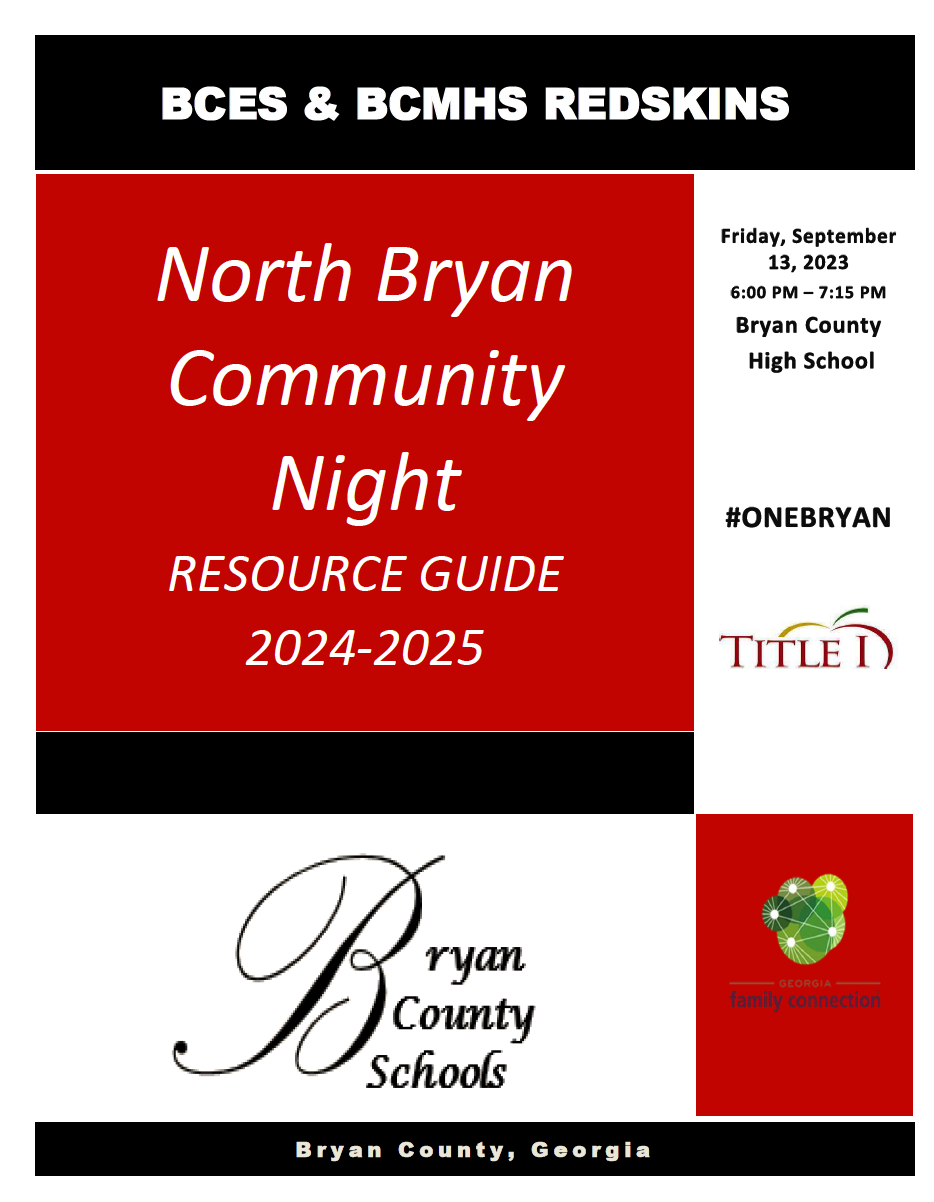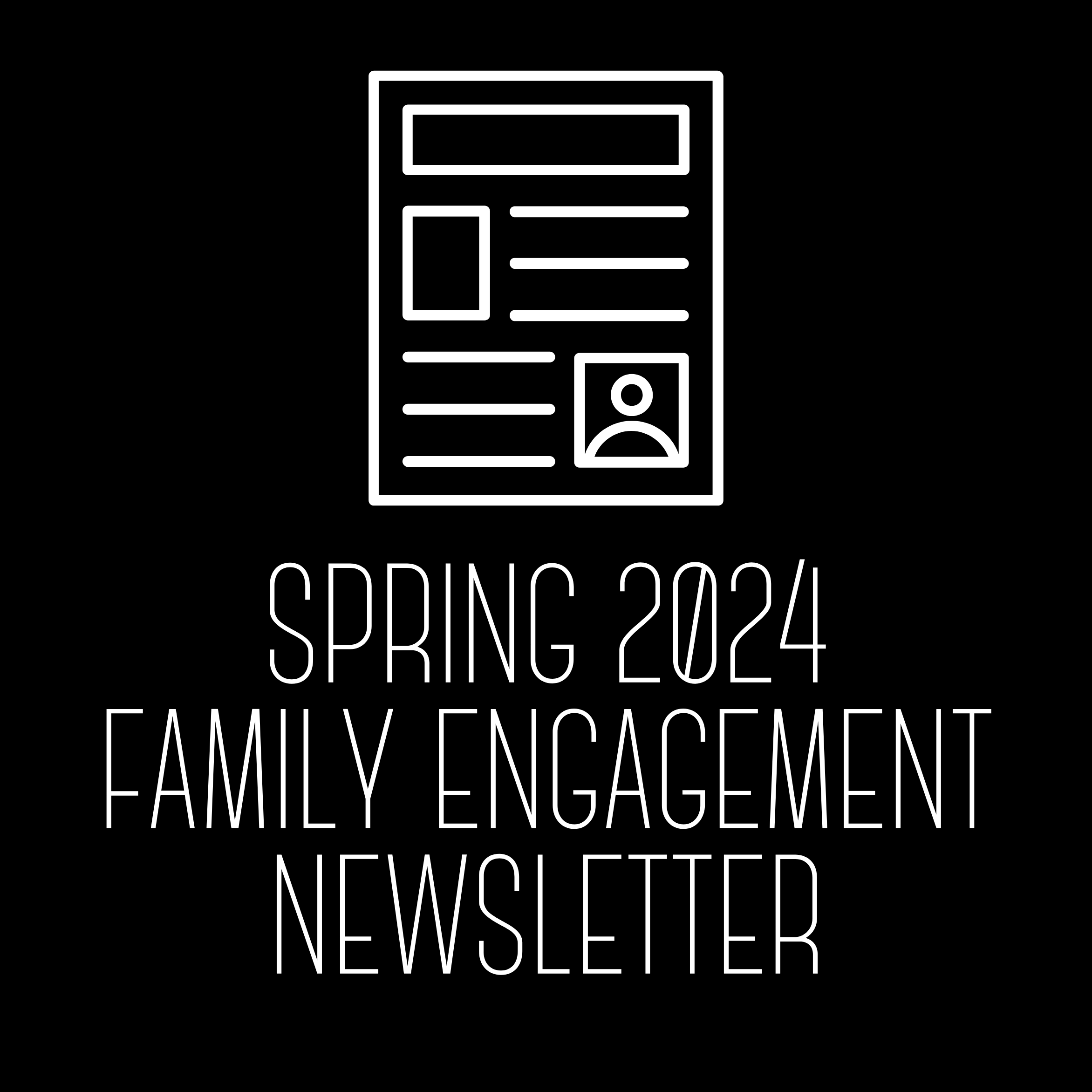Title I, Part A: Parent and Family Engagement
Title I, Parent A parent and family engagement guidelines are met with meaningful and strategic actions to build parent and school staff capacity as outlined in the Every Student Succeeds Act (ESSA). Our schools and district believe that parents, schools, families and communities working together can create meaningful partnerships that ultimately lead to significant gains across the board in student achievement.
Click on following link to access the translatable version of the Resource Guide: https://www.bryan.k12.ga.us/page/parent-engagement-resources
CONTACT INFORMATION:
Salina Furlong,
Title 1 Parent and Family
Engagement Coordinator
sfurlong@bryan.k12.ga.us
Family Engagement Newsletter - Spring
“Spring is nature's way of saying, 'Let's start fresh!' Just like the blossoms, students bloom best when given new opportunities to grow."
-----Author Unknown
How to Build Family-School Partnerships from a Parent’s Perspective
Building a strong partnership with your child’s school starts with mutual respect, open communication, and shared goals for your child’s success. From a parent's perspective, this means being proactive, engaged, and collaborative in your approach.
Benefits of a Family-School Partnership
Improved Student Achievement: When parents and schools work together, children tend to perform better academically.
Enhanced Social and Emotional Development: Students feel more supported and confident when their families and schools are united.
Better Communication: Regular interaction fosters trust and reduces misunderstandings between families and educators.
Shared Responsibility: A partnership ensures everyone is working toward the same goals for the student’s well-being.
Increased Parent Confidence: Parents feel more empowered and knowledgeable about how to support their child’s education.
Build a Successful Family-School Partnership
Communicate Regularly and Respectfully
Stay in touch with teachers and school staff through emails, parent-teacher conferences, or phone calls.
Approach conversations with a solution-focused mindset and a willingness to listen.
Be Actively Involved
A
ttend school events, join the PTA/PTO, and volunteer when possible.
Show your child that their education is a priority by being present and supportive.
Set Clear Goals Together
Work with teachers to understand academic expectations and social-emotional milestones.
Collaborate on strategies to help your child succeed both at school and at home.
Support Learning at Home
Create a consistent homework routine and provide a quiet, distraction-free space for study.
Reinforce the importance of education through encouraging words and discussions about school.
Build Trust and Mutual Respect
Recognize and appreciate the efforts of teachers and school staff.
Share your perspective and concerns honestly while respecting the school’s policies and practices.
Effective Communication
Effective communication between parents and teachers is key to student success. Here are tips to ensure positive and productive interactions.
Establish Early Contact: Reach out at the beginning of the school year to introduce yourself and your child. Share any pertinent information about your child’s needs, interests, or learning style.
Be Respectful and Open-Minded: Approach communication with a positive attitude, respect for the teacher's expertise, and a willingness to collaborate for your child's benefit.
Attend Parent-Teacher Conferences: Make the most of scheduled conferences by preparing questions in advance and actively listening during the meeting.
Use Preferred Communication Methods: Ask teachers about their preferred methods of communication (email, apps, phone, or notes) and use them consistently.
Be Clear and Concise: When communicating, stick to the main points. Provide context if necessary but avoid lengthy explanations that could obscure your main concern or message.
Stay Informed: Regularly review school newsletters, emails, websites, or classroom updates to stay up to date on assignments, events, and school policies.
Be Proactive: If you notice an issue, address it early. Waiting too long can make problems harder to resolve.
Express Appreciation: Acknowledge the teacher’s efforts and show gratitude. Positive feedback can strengthen your relationship.
Collaborate on Solutions: If concerns arise, work with the teacher to identify and implement solutions. Stay focused on what is best for your child.
Be Consistent: Maintain ongoing communication, even when things are going well. Regular check-ins show your continued interest and support for your child’s education.
Fostering mutual respect and understanding between parents and teachers lays the foundation for effective communication and collaboration.
Mental Health Awareness
Supporting mental health awareness is essential for parents to help their children develop resilience, emotional intelligence, and well-being. Here are some tips for parents.
Create a Safe Space for Open Communication: Encourage your child to share their thoughts and feelings without fear of judgment. Actively listen and validate their emotions.
Model Healthy Behaviors: Demonstrate stress management, emotional regulation, and positive coping strategies in your own life.
Teach Emotional Literacy: Help your child identify and name their feelings. Use books, games, or real-life scenarios to build their emotional vocabulary.
Normalize Mental Health Conversations: Discuss mental health openly as part of overall well-being, just like physical health. Use age-appropriate language to reduce stigma.
Recognize Signs of Struggle: Learn the signs of anxiety, depression, or stress in children, such as changes in behavior, sleep, or appetite, and address them promptly.
Encourage Healthy Habits: Promote good nutrition, regular exercise, sufficient sleep, and balanced screen time, which are all crucial for mental health.
Practice Mindfulness and Relaxation: Introduce activities like deep breathing, meditation, or yoga to help your child manage stress and build self-awareness.
Provide Consistent Support: Maintain a structured routine while being flexible enough to adjust for your child’s mental and emotional needs.
Seek Professional Help When Needed: If your child is struggling, don't hesitate to consult a school counselor, therapist, or pediatrician for guidance and support.
Promote Kindness and Inclusion: Encourage empathy by teaching your child to treat others with kindness and to speak out against bullying or discrimination.
By being proactive and supportive, parents can help their children navigate mental health challenges and grow into emotionally healthy adults.
Regular School Attendance
Regular school attendance is essential for a student's academic success, social development, and overall well-being. Here are the some important benefits.
Improved Academic Performance: Consistent attendance helps students stay on top of lessons, complete assignments on time, and perform better on tests.
Development of Lifelong Habits: Attending school regularly builds responsibility, punctuality, and discipline—skills vital for future success.
Enhanced Social Skills: Regular attendance allows students to form friendships, work collaboratively, and build social confidence.
Better Understanding of Material: Being present ensures students don't miss critical explanations, hands-on activities, or class discussions that deepen understanding.
Increased Engagement: Students who attend school consistently are more likely to participate in extracurricular activities, enhancing their school experience.
Higher Graduation Rates: Regular attendance is a strong predictor of whether a student will graduate on time and pursue further education or career goals.
Preparation for the Workforce: Attendance habits prepare students for the expectations of punctuality and reliability in professional environments.
Support for Emotional Well-Being: Schools provide access to counselors, supportive adults, and peers, offering a safety net for emotional and mental health.
Exposure to Opportunities: Students who attend regularly are more likely to benefit from school resources, programs, and events that enrich learning.
Reduction in Risk Behaviors: Regular attendance keeps students engaged in a positive environment, reducing the likelihood of involvement in risky behaviors.
Encouraging regular attendance helps students reach their full potential and lays the foundation for a bright future.
Elementary School
Plant a Mini Garden: Start a small flower or vegetable garden in your yard or in pots. Kids can help with planting, watering, and watching the plants grow.
Create a Nature Collage: Take a walk to collect flowers, leaves, and twigs, then use them to create a nature-inspired art piece at home.
DIY Bird Feeders: Make bird feeders using pinecones, peanut butter, and birdseed. Hang them outside and observe the birds that visit.
Spring Cleaning with a Twist: Turn spring cleaning into a scavenger hunt by giving kids a list of items to find, sort, or organize around the house.
Design Your Own Kite: Build and decorate a kite, then test it out on a breezy day in a park or backyard.
Spring-Themed Storytime: Read books about spring, flowers, or nature together, and have kids illustrate their favorite parts of the story.
Make a Butterfly House: Use a small wooden box or recycled materials to create a butterfly-friendly habitat, then decorate it together.
Cook a Spring-Inspired Meal: Make recipes featuring spring produce like strawberries, carrots, or asparagus, and let kids help with preparation.
Family Yoga in the Garden: Enjoy the fresh air by practicing simple yoga poses in your yard, focusing on poses like the tree, butterfly, or flower.
Spring Photography Project: Use a camera or phone to take pictures of flowers, insects, and outdoor scenes. Create a photo book or digital slideshow together.
These activities combine fun and learning while fostering a sense of connection between parents and children.
Middle High School
Community Service Day: Families can volunteer together, such as preparing care packages, gathering winter clothing donations, or assisting at a local food bank. Engaging in giving back promotes teamwork
Resources
Georgia Studies Virtual Field Trips
https://www.gpb.org/education/georgia-studies/virtual-field-trips
About Children’s Mental Health
https://www.cdc.gov/children-mental-health/about/
Effective Communication With Teachers
https://www.parents.com/kids/education/back-to-school/the-smart-way-to-talk-to-teachers/
6 Ways to be Engaged in Your Child’s Education (article)
https://ptaourchildren.org/be-engaged-education/
A Pep Talk to Students on School Attendance (video)
https://www.youtube.com/watch?v=vRfFtPqo9GY
Please check the following websites for up-to-date information and dates.
Bryan County Elementary School - https://bces.bryancountyschools.org/o/bces
Bryan County Middle High School - https://www.bryancountyschools.org/o/bcmhs
Bryan County Board of Education - https://www.bryancountyschools.org/
Pembroke Public Library Calendar of Events
https://www.strl.info/pembroke-bryan_county_library/program_calendar.php
CONTACT INFORMATION:
Salina Furlong,
Title 1 Parent and Family Engagement Coordinator
sfurlong@bryan.k12.ga.us
Family Engagement Newsletter- Winter
“I've learned that people will forget what you said, people will forget what you did, but people will never forget how you made them feel.”
― Maya Angelou
Reignite the Spark for Family Engagement
As we move into the heart of the school year, we invite you to join us in refreshing our commitment to family engagement. With a renewed focus and energy, we can continue to support our children’s growth and inspire them to make the most of their learning journey.
Here are some ways to bring new energy and passion into family engagement:
Reconnect Through Conversations: Take time each day to talk with your child about what they're learning, their goals, and their experiences at school. These small but meaningful conversations help show your interest and can make a big difference in keeping them motivated.
Explore New Learning Activities Together: Whether it’s reading a book together, working on a small project, or exploring something new that interests them, shared activities reinforce that learning is valuable and fun. Trying fresh activities can help you both rediscover the excitement of learning.
Reframe Challenges as Growth Opportunities: Facing challenges together can strengthen family bonds. By talking through academic or personal hurdles, you can show your child how to view setbacks as steps toward growth and resilience.
Set New Family Goals for the Year: Sit down together to set some new goals. These could be academic or personal, like improving study habits or getting involved in a community activity. Goal setting as a family shows your child that you’re invested in their success.
Celebrate Small Wins: Renew your enthusiasm by celebrating small victories. Acknowledging accomplishments—big or small—motivates your child and strengthens the connection between school and home.
Thank you for all you do as partners in your child’s education. Together, let’s bring renewed passion and purpose to family engagement and continue to make a positive impact on their learning experience.
The Dream Team: Parents + Teachers + Students
At Bryan County Schools, we believe that a strong partnership between parents, teachers, and students forms the foundation for academic and personal success. Each member of this triad brings essential strengths that contribute to a positive and supportive learning environment.
Parents play a crucial role by guiding and encouraging learning at home, establishing routines, and setting high expectations. Your support and involvement in your child’s education help them see the value in their efforts and the importance of growth and resilience.
Teachers work daily to inspire, guide, and educate. They bring knowledge, patience, and dedication to help each child reach their potential. When teachers and parents connect, students experience a unified commitment to their success.
Students are the heart of this partnership. When they see that their parents and teachers are invested in their learning, they feel empowered to work harder and strive for success. Their engagement and efforts complete the triad and create a dynamic path toward achievement.
Together, we can make a lasting impact. Thank you for your continued involvement, support, and collaboration with us.
Boosting Health, Boosting Success
At Bryan County Schools, we recognize the essential role of wellness in helping students succeed academically, socially, and emotionally. When children feel balanced and healthy, they are better able to focus, engage, and thrive in school and in their personal lives. Wellness isn’t just about physical health—it also includes emotional and mental well-being. By making wellness a family priority, you can model healthy habits that support your child's development.
Here are five tips for promoting family wellness at home:
1. Stay Active Together – Make time for family activities like biking, walking, or playing sports. Physical activity helps reduce stress and builds healthy habits that last a lifetime.
2. Prioritize Sleep – Set and maintain regular bedtimes to ensure everyone gets enough rest. Consistent sleep routines help improve focus, mood, and energy levels.
3. Nourish with Healthy Meals – Involve your child in planning and preparing balanced meals. It’s a great way to teach healthy eating habits and to spend quality time together.
4. Practice Mindfulness – Encourage simple practices like deep breathing or short family meditation sessions to help everyone manage stress and improve emotional resilience.
5. Limit Screen Time – Create "unplugged" moments to foster personal connections and reduce the effects of excess screen time on mental health and sleep.
Thank you for all that you do to support your child’s wellness. When we work together to prioritize wellness, we set our students up for lifelong success.
Mid-Year Magic: Reignite Your Goals
As we reach the midpoint of the school year, it’s a great opportunity to check in, reflect, and reset goals. By reviewing progress and making adjustments, we can build on successes and address challenges to stay on course. Here are some steps to help everyone get back on track and finish the school year strong.
Reflect on Progress Together: Parents and Students: Discuss goals set at the beginning of the year. What progress has been made? What achievements are you proud of? Identifying what worked well and where improvements are needed sets a foundation for the next steps.
Adjust Goals if Needed: Goals that felt achievable in the fall might need adjustment as the year progresses. Make goals specific, measurable, and manageable. Instead of aiming for a broad improvement like "do better in math," focus on something like "complete all math homework on time each week."
Set Small, Achievable Milestones: Breaking down larger goals into smaller steps can make them more manageable. Celebrate each step of progress to keep everyone motivated. For example, if the goal is to read more, set a milestone of reading a certain number of pages or books per month.
Revamp Routines and Habits: Mid-year is an ideal time to revisit routines, such as homework, sleep, and study habits. Implementing small changes, like a designated study time, can make a big difference in focus and productivity.
Encourage Open Communication: Keep the lines of communication open. Check-ins help everyone stay aligned and provide a space to ask for help or celebrate wins.
Stay Positive and Persistent: Acknowledge that challenges are part of the process and encourage a positive mindset. Reassure students that setbacks are normal and that their progress is worth the effort. Persistence and positivity are key in reaching year-end goals.
By reflecting, adjusting, and staying committed, we can help every student finish the year feeling accomplished and prepared for the next steps. Let’s keep working together to make this year a success! This mid-year reset is a chance to set everyone up for a productive and fulfilling rest of the school year.
Winter Adventures: Family Fun & Learning Together
Winter Storytelling Night: Gather your family to share your favorite winter-themed stories or read aloud a classic winter tale. Storytelling encourages literacy, creativity, and family bonding.
Seasonal Craft Workshop: Make unique winter-themed crafts and decorations such as snowflakes, ornaments, or winter wreaths. Crafting is a fun, hands-on way to spend quality time together, fostering creativity and teamwork.
Family Game and Puzzle Night: Set up a game night with board games, puzzles, or winter-themed trivia that you can work on together. Games encourage problem-solving and teamwork. A little friendly competition also brings out family spirit and builds connections.
These activities create meaningful family time, foster community connections, and support educational engagement, all while celebrating the winter season.
Elementary School
Gingerbread House Decorating: Have a family gingerbread house decorating contest. Decorating gingerbread houses is fun and interactive.
Winter Reading Challenge: Create a winter-themed reading challenge where your family reads together. You can choose prizes like one night off from cleaning the kitchen, dinner of your choice, etc. Literacy provides a way to engage with your student’s goals in a fun, goal-oriented way.
Hot Chocolate & Storytime: Have a cozy evening with hot chocolate, cookies, and story time featuring winter-themed books. This allows families to bond over stories, fostering a love of reading in a warm, memorable setting.
These activities combine fun with family bonding, creating memorable experiences that strengthen parent involvement and celebrate the winter season.
Middle High School
Community Service Day: Families can volunteer together, such as preparing care packages, gathering winter clothing donations, or assisting at a local food bank. Engaging in giving back promotes teamwork.
Holiday Baking Challenge: Set up a friendly baking competition where your family decorates winter-themed treats like cookies or cupcakes. This combines fun with culinary skills and is a festive way to bring out creativity and teamwork.
Goal-Setting and Vision Board Workshop: Have your family create vision boards and set goals for the new year. This can be a paper or an online version. Reflecting on personal and academic aspirations promotes future planning and fosters meaningful family discussions.
These activities provide age-appropriate engagement for middle and high school students, allowing families to connect while fostering academic, social, and community involvement.
Resources
Georgia Studies Virtual Field Trips
https://www.gpb.org/education/georgia-studies/virtual-field-trips
Creating a Safe Internet for our Children
https://ptaourchildren.org/creating-a-safe-internet-for-our-children/
Please check the following websites for up-to-date information and dates.
Bryan County Elementary School - https://bces.bryancountyschools.org/o/bces
Bryan County Middle High School - https://www.bryancountyschools.org/o/bcmhs
Bryan County Board of Education - https://www.bryancountyschools.org/
Pembroke Public Library Calendar of Events
https://www.strl.info/pembroke-bryan_county_library/program_calendar.php
CONTACT INFORMATION:
Salina Furlong,
Title 1 Parent and Family Engagement Coordinator
sfurlong@bryan.k12.ga.us
Family Engagement Newsletter – Fall
Teaming Up with Families to Fuel Student Success
In Bryan County Schools, we know family engagement is the cornerstone of a successful educational journey. Our purpose is not just to inform but to inspire and empower parents and families to play an active, meaningful role in their child's education. As we kick off this school year, we want to ensure that every parent, guardian, and stakeholder knows they are a vital part of our school community.
Race Into the School Year Ready to Shine and Succeed
Starting the school year strong is crucial for students at every level—elementary, middle, and high school. As parents, your involvement can shape how successful the year will be.
Elementary School
For elementary students, establishing a consistent routine is vital. Help them create a fun, organized workspace, read together daily, and nurture their natural curiosity. Encouraging them to ask questions and explore things helps build a solid academic foundation and a love for learning.
Middle School
In middle school, students begin to experience greater independence, and this is a perfect time to teach them organizational skills. Work with them to create a system for keeping track of assignments, using planners, and managing their time effectively. Encourage their growing interests in extracurricular activities, sports, or creative hobbies, as this is a stage where identity formation begins to take center stage. Your guidance during these years helps them feel supported while they navigate new social dynamics and academic responsibilities.
High School
For high school students, success often depends on balancing academics, extracurriculars, and future goals. Help them set realistic short- and long-term goals—whether it’s college preparation, developing a passion, or exploring potential career paths. Check in with them regularly about both their academic progress and well-being, and offer support when challenges arise. Encouraging independence while still being available creates a safety net for them as they learn to manage their responsibilities, make important decisions, and prepare for the future.
Growing Bright Minds and Future Leaders
Bryan County Schools believe in the excellence and success of our students. Raising academically successful students is all about creating the right environment and habits at home. Start by setting a routine that includes a regular homework time, ensuring your child knows that schoolwork is a priority. Encourage reading daily, whether it's books, articles, or even educational websites. Be involved—ask about their day, show interest in their school projects, and communicate with teachers to stay informed. It's also important to create a quiet, organized space for studying, free of distractions like TV or phones. Praise effort, not just results, and help them learn from mistakes. Most importantly, keep the pressure low and the support high—your belief in them will fuel their confidence and success.
This November, Let's Shine a Light on Family Involvement!
November is National Parent and Family Engagement month. When schools and families work together to support learning, everyone benefits and magic happens! Watch for a fun calendar coming home in November with engaging activities to enjoy with your student, plus some awesome links to make learning even more exciting!"
Autumn Adventures: Family Fun & Learning Together
Elementary
Leaf Art and Collages: Take a walk together to collect colorful fall leaves, then create leaf art or collages at home. Families can press leaves between books or use them to make creative designs like animals, trees, or patterns. This is a great way to spark creativity while enjoying the beauty of the season.
Pumpkin Science Experiment: Carve a pumpkin and turn it into a science experiment by creating a "pumpkin volcano" with baking soda and vinegar. Discuss the chemical reaction as a fun way to introduce basic science concepts while enjoying seasonal fun.
Bake Fall Treats Together: Engage in a family baking session to make fall-themed treats like pumpkin muffins, apple pie, or cinnamon cookies. Involving kids in the kitchen helps them practice math and reading skills as they measure and follow recipes.
Middle High
Autumn Photography Challenge: Take on a fall photography challenge where parents and teens capture seasonal images like colorful leaves, sunsets, or nature scenes. Share and discuss your photos as a way to connect creatively and improve photography skills together.
Cook a Fall Feast Together: Plan and cook a full fall-themed meal as a family, including dishes like roasted vegetables, apple cider, or pumpkin pie. Encourage older children to take the lead on recipes, fostering independence and teamwork in the kitchen.
Volunteer as a Family: Engage in a fall-themed volunteer activity such as serving meals at a local shelter, raking leaves for neighbors, or helping with a community harvest. Volunteering together promotes empathy, responsibility, and shared values while making a positive impact.
Resources
Resource Guide - https://5il.co/301s0
Video Link
Parent Involvement Makes a Difference to School Kids.
https://www.youtube.com/watch?v=-PZyeecFLEE
Article Link
The Importance of Parental Involvement for Student Success
https://ptaourchildren.org/parent-involvement-student-success/
Please check the following websites for up-to-date information and dates.
Bryan County Elementary School - https://bces.bryancountyschools.org/o/bces
Bryan County Middle High School - https://www.bryancountyschools.org/o/bcmhs
Bryan County Board of Education - https://www.bryancountyschools.org/
Pembroke Public Library Calendar of Events
https://www.strl.info/pembroke-bryan_county_library/program_calendar.php



